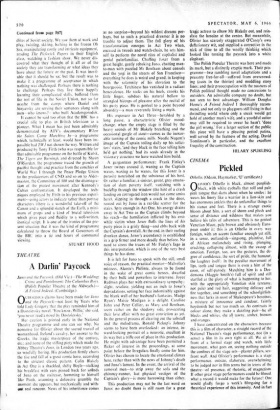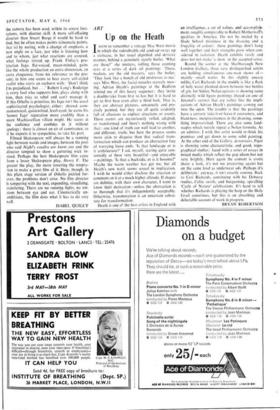CINEMA
Pickled
Othello. (Odeon, Haymarket, 'U' certificate.)
rILIVIER'S Othello is black, almost purplish-
black, with white eyeballs that roll and pale pink tongue that darts about when he smiles: he wears his finery like a warrior in a lion-skin and has enormous anklets that do unfamiliar things to his stance and feet. There is a strange exotic bloom about him, a sort of sheen and plush and sense of distance and wildness that makes you believe his tales of adventure. This is no genteel Venetian Moor, pale brown and obviously Euro- pean under it; this is an Othello in every way foreign, with an accent familiar enough yet still, in a sense, outlandish—singsong, plaintive, full of African melancholy and rising, plunging, cracking, collapsing almost, with the swoop of emotion. Foreign, too, are the gestures, the de- gree of confidence, the sort of pride, the humour, the laughter itself : in the peculiar movement of lips, teeth and tongue there is even a hint of the coon, of self-parody. Matching him is a Des- demona (Maggie Smith's) full of spirit and still startled at the glory of what is happening to her, with the appropriately Venetian skin (creamy, not pale) and red hair, suggesting delicacy and fire together, and something of the schoolgirlish- ness that lurks in most of Shakespeare's heroines, a mixture of innocence and candour, faintly hoydenish but not too much so. As contrasts in colour alone, they make a dazzling pair—he all blacks and whites, she all tawny, amber, browns and oranges.
I have concentrated on the characters because this is a film of character, a straight record of the National Theatre's stage performance, not (in a sense) a film in its own right at all. We sit in front of a formal stage and watch, with little movement, what goes on, seeing nothing outside the confines of the stage sets—plaster pillars, sea- front wall.- And Olivier's performance is a stage performance. outsize, elaborate, overwhelming, to be judged not in film terms but in terms of the theatre—of presence, of rhetoric, of magnetism. If other great stage performances could be filmed, what a record it would make for the future! One would gladly forgo a week's filmgoing for a theatrical experience of this intensity. And in fact the camera has been used, within its severe limi- tations, with discreet skill. A more self-effacing director than Stuart Burge it would be hard to find, but he often makes points (cinematic points, that is) by noting, with a change of emphasis, a new angle on a face, just who is listening how and to whom, just what reactions are aroused, what feelings stirred up. Frank Finlay's pro- letarian lago, flat-voiced, mean-minded, gains like the whole production an extra dimension, an extra eloquence, from his relevance to the pre- sent; in him one seems to hear every self-styled realist who starts an outburst with : 'Don't think I'm prejudiced, but . . .' Robert Lang's Roderigo is every fool who supports him, plays along with him, then tries to rebel and can't manage it. If this Othello is primitive, his lago isn't the usual sophisticated psychologist, either: shrewd. com- monsensical, quickwitted, level-eyed, he earns his 'honest Iago' reputation more credibly than a more Machiavellian villain might. He stares at the audience and confides in it without apology : there is almost an air of connivance, as if he expects it to sympathise, to take his part.
Filmed Shakespeare will always be a running fight between words and images, between the poet who said Night's candles are burnt out and the director tempted to show a guttering wick in- stead. Perhaps the best Shakespeare film came from a lesser Shakespeare play, Henry V. The greater the play, the more towering the tempta- tion to make a great film of it. Here, though, in this plain stage version of Othello pickled for- ever, the problems don't arise. No film director is tampering with the text, expanding, visualising, translating. There are no running fights, no ten- sions between eye and ear. Cinematically nit; ambitious, the film does what it has to do very well.
ISABEL QUIGLY



































 Previous page
Previous page